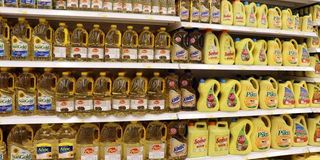Cooking oil processors want tax scrapped

Different brands of cooking oil on the shelves of a supermarket.
Manufacturers of vegetable oils have petitioned the government to scrap the 10 per cent import duty on crude palm oil, which they say has pushed up the price of the commodity significantly.
Mr Billow Kerrow, the spokesperson of the Edible Oil Manufacturers Association of Kenya, revealed yesterday that the lobby has written to the National Treasury to have the tax removed, saying failure to would make the locally made products uncompetitive.
“We have engaged the National Treasury through a letter and told them that this is unacceptable because they did not involve the industry before the tax was imposed. But we haven’t gotten any response,” said Mr Kerrow.
He noted that it is wrong for the government to “ambush us with taxes that are already too many and punitive”.
With the new tax, the price of 20 litres of edible oil, which has been retailing at Sh3,800, has shot up by over Sh400 as manufacturers grapple with increased costs.
The import duty on the crude palm oil, a key raw material for the manufacture of cooking oil, became operational on July 1. This is after Kenya’s application to the Council of Ministers of the East African Community (EAC) under the Common External Tariff to impose the tax was approved and published in the EAC Gazette notice of June 30.
The approval saw Kenya join Uganda, which was the only EAC member state implementing the tax even as the local edible oil.
To undo the tax, Kenya simply needs to write to the EAC Council of Ministers.
Manufacturers questioned the rationale of Kenya’s decision to apply for the new tax given that Kenya fully imports crude palm oil.
The tax is just one of the many imposed on the product, which is an essential commodity for millions of Kenyans. This increases the total taxes imposed on the product to 32 per cent.
The other taxes imposed on imported crude palm oil include VAT at 16 per cent, Import Declaration Fee (2.5 percent) and Railway Development Levy (2 per cent). There is also the Oil Crops and Nuts Development Levy charged at the rate of 2 per cent.
Mr Kerrow, the former Mandera Senator and chairman of Darfords Industries Limited, warned that unless the tax is removed, the local manufacturers will be left with no option but to cascade the costs down to the consumers. This is likely to push the product out of reach of many.
Further, Mr Kerrow noted, failure to abandon the tax will undo the steady price drops on vegetable oil and related products that Kenyans have been enjoying on a combination of a strengthening shilling and major source markets like Indonesia lifting caps on export quotas.
“Things have become so expensive. We no longer export. The countries we used to export edible oil to like Democratic Republic of Congo and Rwanda, among others, are now importing directly from Malaysia and Indonesia at cheaper rates because our product is not competitive,” said Mr Kerrow.
“Abandoning this tax will cushion millions of Kenyan consumers, especially the vulnerable ones, against imminent significant price hikes for these essential household products,” he added.
The effect of the new tax will affect other products that depend on local processing of crude palm oil. For instance, over 20,000 tonnes are used per month to make soap products, employing over 5,000 people.
The bread and baked products industry depends on palm stearin as a by-product of crude palm oil refining. The implication of the tax, according to the manufacturers, will see the price of a 400-gram loaf of bread increase by about Sh10 in the coming days.
“Such price hikes will disproportionately affect the most vulnerable members of society, exacerbating the already high cost of living, plunging millions into deeper financial distress,” said Mr Kerrow.





